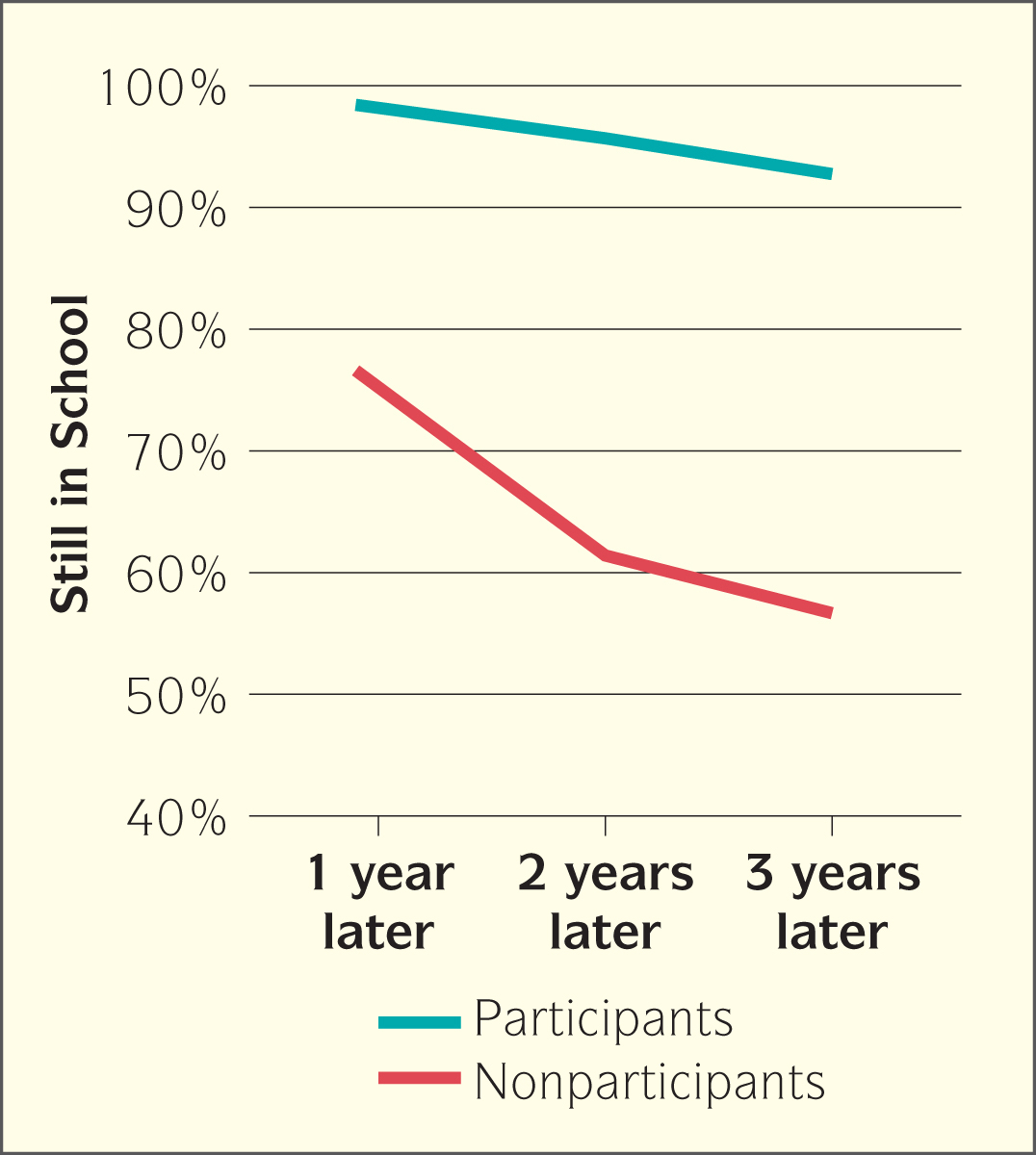Grow and Sustain Healthy Relationships
All the connection skills we’ve discussed so far — effective communication, emotional intelligence, conflict resolution — have an overarching purpose: helping you build and sustain healthy relationships while you’re in college. These relationships are important because to succeed in school, you need a strong social support network — a group of people who encourage you when things get tough and join in celebrating your accomplishments. This network can include people outside of school, as well as classmates, faculty members, members of study groups, and people you meet in campus clubs, professional organizations, or even online. In this section we look at how to connect with the important members of your social support network.
ACTIVITY: Ask students to create a list of people in their support network. What actions can they take on a regular basis to keep these relationships strong and healthy?
Connect with Classmates

Getting to know your classmates can help you build a network of people who — whether they become good friends or just study partners — can keep you motivated and connect you to information and other resources you need to succeed in class.
To forge connections in face-to-face classes, notice which students seem motivated to learn. Strike up a conversation with these students before or after class, and ask if they might be interested in organizing a study group.
If you’re taking an online class, look for opportunities to get to know your classmates. For example, some online classes may require students to introduce themselves in a discussion forum and respond to one another’s introductory posts. And online classes often provide separate discussion forums in which students can get to know each other and share resources related to the class, the college, or other common interests.
Connect with Instructors
When you feel connected to your instructors, you’ll feel more comfortable asking them for help. And when they know you, they’ll be more likely to give you career advice, point you to internship or job opportunities, and write you letters of recommendation. So try chatting with your instructors before class, after class, or during their office hours — although take care to maintain an appropriate degree of professionalism in these conversations. Telling an instructor you saw a great concert last night is fine. Describing how wild and crazy you got at the concert, on the other hand, is not.
266
And keep in mind that you communicate with your instructors not only with conversation but also with your nonverbal behavior. In a face-to-face class, getting to class on time, sitting near the front of the room, making eye contact, shutting off your phone (no texting), and taking notes shows your respect for your instructors and your interest in the class material. And in an online course, your instructor will assess other aspects of your communication, including the quality and frequency of your discussion board posts and your e-mail etiquette. Be sure to follow the guidelines in the following box when crafting e-mails to your instructors.
CONNECT
TO MY CLASSES
Which of your current instructors seem most approachable? Why? For those who don’t seem approachable, forge a connection by visiting them during their office hours or contacting them by e-mail. Then write a short paragraph about your experience, including how it affected your impressions of these instructors.
WRITING PROMPT: Ask students to write a mock e-mail to an instructor who gave them a bad grade on an assignment. Discuss how to use the conflict resolution skills discussed in this chapter.
HOW TO COMMUNICATE WITH YOUR INSTRUCTOR VIA E-MAIL
Use the subject line to indicate the content and purpose of your e-mail (“Question about deadline extension for English literature paper”).
Address your instructor formally by his or her appropriate title — for example, “Dear Dr. Jones….”
If you don’t know the instructor personally, explain who you are. For example, “I am a student in your 8:00 a.m. English literature class.”
Be courteous in your tone, even if you’re stating a complaint.
Use complete sentences, proper sentence structure, and correct spelling and grammar. Proofread your message and use the spell checker before you hit “Send.”
Keep your message brief and to the point. If something requires a long explanation, set up an in-person meeting.
Never use all capital letters in an e-mail. That’s considered shouting.
Review your e-mail to make sure you’ve included all relevant details and any required attachments.
FOR DISCUSSION: Provide some examples of poor e-mail communication by students, and then add your own tips for communicating with instructors via e-mail. After you provide examples and advice, ask students to respond with their reactions and ideas.
Connect with Your Campus Community
ACTIVITY: Have students research what clubs, organizations, or activities are available at your school. Have them select one they find interesting and obtain contact information, location, and meeting time. You may also ask students to attend at least one of these meetings or activities and report back.
Connecting with the larger campus community is another great way to meet people and build relationships. Your school may have a number of student-led clubs and organizations to fit your interests, values, and affiliations — everything from a Ballroom Dance Club and a Campus Vegetarian Society to a Korean American Student Association and an Accounting Club. Additionally, you may want to get involved in student government to develop leadership skills or join other student organizations that provide services to the local community, such as Big Brothers Big Sisters. Your college may even offer classes that combine classroom instruction with volunteer experience in the community, called service learning. With so many opportunities, your options for meeting and connecting with other people are endless!
Service Learning: Classes that combine classroom instruction with volunteer experience in the community.
267
THE VALUE OF GETTING INVOLVED ON CAMPUS
spotlight onresearch
You may be thinking, “Joining a campus club sounds fun, but I need to focus on getting good grades.” Absolutely, you need to fulfill your obligations, but research shows that getting involved on campus has benefits. Let’s look at one study.

Researchers at a large state college tracked the extracurricular activities of almost 15,000 first-year students to determine how active involvement on campus related to their grades and how long they stayed in college. The students were divided into two groups: those who participated in extracurricular activities (student clubs, student government, orientation) at least once during their college career and those who never participated in any extracurricular activities. Of those who participated, 64 percent were involved in one activity, 24.8 percent in two activities, and 11.2 percent in three to eight activities. The researchers discovered some interesting facts.
Students who participated in campus activities achieved higher cumulative GPAs than those who didn’t.
Students who participated in campus activities remained in college at higher rates than those who didn’t.
Why might this be so? Other research provides some clues. First, getting involved on campus can make college more fun and interesting, thus motivating students to invest more time and energy into their studies.7 Second, participation in campus activities can help students connect with others on campus, increase their social support network, and develop confidence and social skills — which in turn may make it easier to ask for help from instructors, advisers, or other college resources.8 Finally, feeling like a valued member of the campus community may instill a sense of pride and belonging that further serve as motivation.
THE BOTTOM LINE
Participation in campus activities is associated with academic success and staying in school — just two of the many benefits of getting involved.
REFLECTION QUESTIONS
Question 11.1
1. Do you currently participate in any campus activities or organizations? Why or why not?
Question 11.2
2. How could joining a campus organization help you succeed academically?
Question 11.3
3. How could joining a campus organization be good for your career?
J. Wang and J. Shiveley, The Impact of Extracurricular Activity on Student Academic Performance (Sacramento: California State University, Sacramento, Office of Institutional Research, 2009).
268
Connect with Others Online
Joining online communities and networks that fit your interests and needs can also help you build relationships.9 For example, through social media sites such as Facebook and Twitter and professional networking sites such as LinkedIn, you can meet others and stay connected through activities like wall posting, picture sharing, and instant messaging. If you want to meet people who share your interests, you can join an online discussion forum. If you want to make changes in your life, such as losing weight or stopping drinking, you can join an online support group.
But use caution in your interactions with online communities. In particular, reflect on what you’re posting. Five years from now, would you be embarrassed by the photo of yourself you just shared? If a potential employer saw the image, could it jeopardize your chances of getting your dream job? (Yes, some recruiters will search your name on the Web.) And think critically about others’ posts, including their trustworthiness: Is the information accurate? Is its source reliable and respectable? Finally, if you arrange a face-to-face meeting with someone you met online, practice personal safety: Let someone else know about the meeting, get together in a public place, and consider bringing a friend along with you.
Stay Connected with Friends and Family
It takes time and effort to maintain relationships, but even as a busy college student you can use active listening, emotional intelligence, and assertiveness skills to show the people in your life off campus just how special they are. Here are a few strategies for preserving meaningful relationships with friends and family while in college.
ACTIVITY: If your college has a counseling center, invite a counselor to talk to your class about maintaining relationships.
Stay connected with your loved ones through e-mail, texting, Facebook, phone calls, or face-to-face visits.
Actively listen to any concerns or fears they might have for you.
Share your hopes and dreams with them.
Let them know how they can support you emotionally while you’re in school.
Invite them to campus or show them your online coursespace so that they feel they’re part of your college experience.
Communicate your needs assertively. Don’t assume they can read your mind.
Develop empathy — try to understand what it’s like for them to spend less time with you.
Let minor disagreements go.
If tensions build, address the issue in a calm, respectful way using “I” statements.
Try to negotiate mutually beneficial solutions to any conflicts that arise.
WRITING PROMPT: Recognizing when others are being empathetic can help increase a person’s empathy. Ask students to write some examples of times when their friends or family members were empathetic. Encourage them to be specific: What did it feel like and sound like? Ask them how they can use these experiences to increase their own empathy.
269
voices of experience: student
MAINTAINING RELATIONSHIPS

| NAME: | Samuel Caleb Stumberg |
| SCHOOL: | Montana State University, Billings |
| MAJOR: | History Education |
| CAREER GOAL: | Teaching |
“Balancing my relationships, work, and school is what has helped me get through the tough times.”
Working part-time, going to college full-time, and maintaining a social life is anything but easy. Balancing my relationships, work, and school is what has helped me get through the tough times. Family and friends are extremely important; they provide support, love, and joy. However, maintaining relationships and doing well in school require good communication skills and the ability to make time for others.
I try to make as much time for my friends and family as I can. I like to get coffee with my friends in between classes or go on runs with them. Playing games is always fun — anything that can bring people together. I live far away from my family, so it’s difficult to stay in touch with them. I try to call them once a week, for an hour or so, to catch up.
Maintaining relationships isn’t all fun and games, though. Recently, some problems arose with my roommates. We said things that we didn’t mean, and it seemed like our friendships would end. One of our main problems was that we weren’t all in the same room; we were relying on texting for most of our communication. Texting is a terrible form of communication because you can’t see the other person or communicate emotion.
Eventually, we were able to resolve our problem. We dropped the fighting and started to speak more assertively. We found that it was better to be respectful to the people with whom you’re discussing an issue. Use your words wisely and aim your criticisms at the topic, not the person. When we started communicating like adults, we realized how childish our disagreement was. We apologized to one another, and things were settled. I learned that if you want to maintain friendships, sometimes you have to bite your tongue.
YOUR TURN: Have you ever had a disagreement with important people in your life, as Caleb did with his roommates? If so, what did you learn from this experience? What approaches seemed most (or least) useful for managing the disagreement and maintaining the relationship? Do you agree with Caleb that texting is a poor form of communication? Have you used it successfully?
270